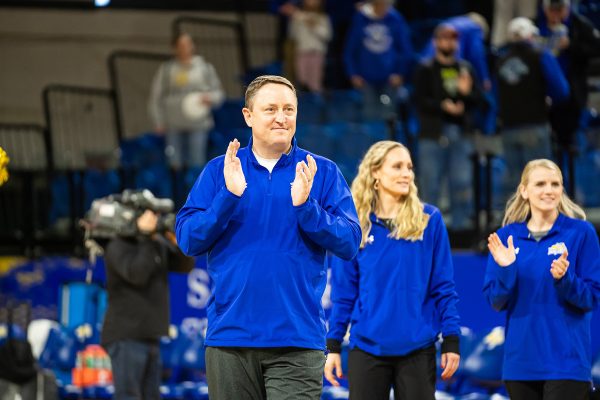New Plant Science head is ‘Wright’ fit at SDSU
November 13, 2013
The Plant Science Department has a new department head with big visions for it’s future. David L. Wright became the new Plant Science Department Head this year at SDSU.
Wright was recruited by SDSU faculty members, who encouraged him to apply. Wright admitted he was always impressed by the quality of faculty and the uniqueness of the agriculture and climate in South Dakota.
“We have the right person, at the right time, for the right job. He’s a good fit for the department,” said Barry Dunn, dean of College of Agriculture and Director of SDSU Extension.
The former department head, Sue Blodgett, stepped down to take up a new position at Iowa State University in 2010. For two years, Doug Malo stepped in to cover the duties required while the college searched for a new department head. Dunn took on a national search, and while there were many applications, he said that they narrowed it down to five before choosing Wright.
“All five were very qualified, but Dr. Wright worked in soybean industry and he had a lot of experience and knowledge. He seemed to be a great fit,” said Dunn.
Wright received his bachelor’s and master’s degree in Agronomy from Iowa State University and his doctorate from Kansas State University. Wright states that he got his “read education” by working with farms all across the country. He worked for 20 years in the industry with seed companies and farmers. He then took up a job as a visiting professor at Iowa State.
According to Dunn, the Plant Science Department is changing rapidly with biotechnology and precision agriculture. Some of Wright’s duties as the new department head include providing leadership and vision for the department. One of the most important duties Wright has includes developing this vision to where SDSU should be in 10 to 15 years to be sure graduates are more competitive versus other universities.
“The Plant and Science department is very diverse,” said Wright. “It includes three majors: agronomy, horticulture, and landscape. Very few universities incorporate landscape into their programs.”
So far, Wright is adjusting well. He said the university, including faculty and administration, has embraced him from coming from outside. His transition has been very smooth and he hopes to be teaching in the next two to three years.
One of the real challenges he is facing is keeping up with everything going on in the department with the world-class programs and the extension program. Also, with over the 350 undergraduate students, there is much success that is taking place, said Wright. “The department is growing very rapidly and there are advanced courses being created to accommodate needs.”
Even with the many challenges, Wright said his favorite thing about the department is the people. He refers to the faculty as “some of the best I’ve seen,” and “unique in teaching programs.”
“The department head opportunity is most challenging, but it is also the best thing I’ve ever done,” said Wright.
























